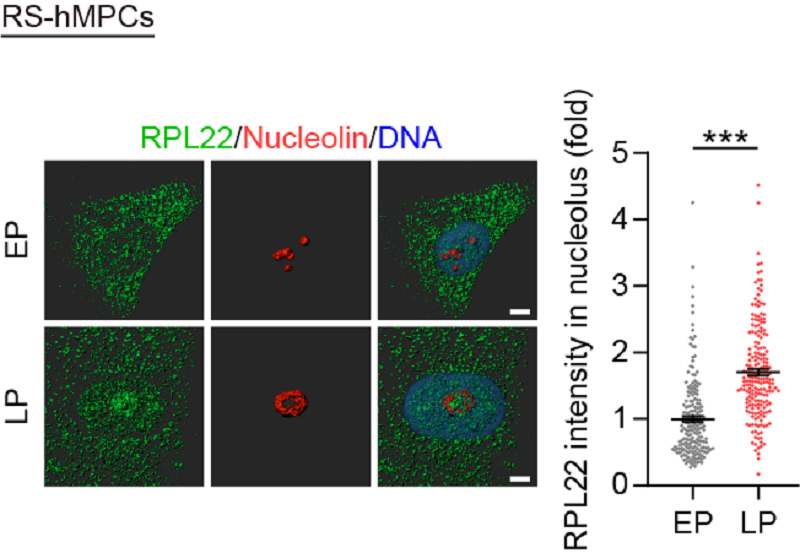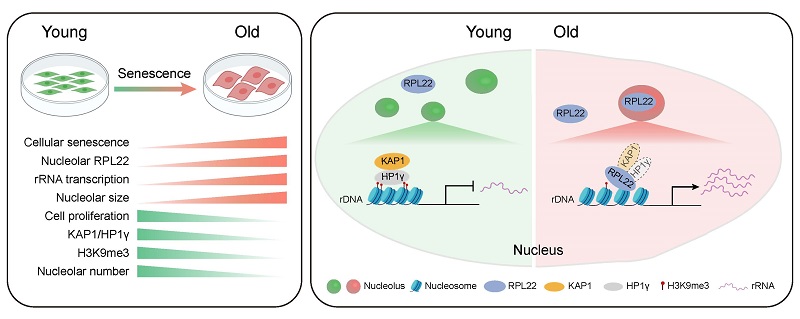Ribosomal Protein RPL22 Drives Human Stem Cell Aging
The ribosome, known as the molecular machinery responsible for protein synthesis within cells, plays a key role in cellular life activities. Most studies on ribosomal protein functions have focused on their involvement in organismal development and disease progression, but the relationship between ribosomal proteins and aging remains to be further explored.
Recently, a collaborative study from the Institute of Biophysics, the Institute of Zoology, and the Beijing Institute of Genomics, all part of the Chinese Academy of Sciences, has utilized CRISPR/Cas9 gene screening technology to identify ribosomal protein RPL22 as a key factor driving human stem cell aging.
This study is the first to reveal that RPL22 promotes cell aging by disrupting the heterochromatin structure of the nucleolar region, leading to increased rRNA expression. The findings were published in Nucleic Acids Research on September 11, 2024.
Researchers conducted a CRISPR/Cas9-based gene loss-of-function screen of 332 ribosome-related genes and found that ribosomal protein RPL22 is closely associated with human stem cell aging. Moreover, RPL22 accumulates during the aging of human mesenchymal progenitor cells.
Through CRISPR/Cas9 gene editing and directed stem cell differentiation technologies, the researchers discovered that overexpression of RPL22 significantly accelerates cell aging, while knockout of RPL22 alleviates it.
By constructing RPL22 mutants lacking ribosomal function, they found that the pro-aging effect of RPL22 does not depend on its ribosomal function. Immunofluorescence experiments further showed that RPL22's ability to promote aging is dependent on its nucleolar localization.
Additionally, researchers found that knocking out RPL22 in human mesenchymal progenitor cells could alleviate aging phenotypes in various aging models, including pathological aging (HGPS and WS models), stress-induced aging models (UV and H2O2-induced stress), and physiological aging models (primary mesenchymal progenitor cells isolated from elderly individuals). This suggests that RPL22 could serve as a potential molecular target for interventions in aging and aging-related diseases.
This study is the first to reveal a novel molecular mechanism by which ribosomal protein RPL22 promotes cell aging. It does so by interacting with heterochromatin proteins in the nucleolar region, downregulating their expression, thereby disrupting the nucleolar heterochromatin structure and increasing rRNA expression. This discovery offers a new direction for research into cellular aging.

Figure 1. A gene loss-of-function screen based on CRISPR/Cas9 technology revealed that RPL22 is associated with human stem cell aging.
(Image by WEI Taotao's group)

Figure 2. RPL22 accumulates in the nucleolus of late-passage cells.
(Image by WEI Taotao's group)

Figure 3. RPL22 downregulates the protein levels of heterochromatin proteins KAP1, HP1γ, and H3K9me3 in the nucleolar heterochromatin region, disrupting the heterochromatin structure and thereby inducing cellular aging.
(Image by WEI Taotao's group)
Article link: https://doi.org/10.1093/nar/gkae740
Contact: WEI Taotao
Institute of Biophysics, Chinese Academy of Sciences
Beijing 100101, China
E-mail: weitt@ibp.ac.cn
(Reported by Prof. WEI Taotao's group)

